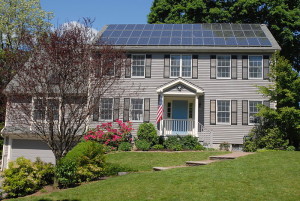 Home solar panels near Boston, MA
Home solar panels near Boston, MA
Are you looking to save money on your utility bills, along with helping to maintain a safe and healthy environment? Then join in the rapidly growing renewable energy movement by powering your home with solar energy. Before you install home solar panels, there are many important factors to consider. I’m going to provide you with a buying guide that gives you both the advantages and disadvantages of home solar panels, along with the elements you will need to efficiently and effectively harness solar energy. The main advantages of solar energy are it is economical, clean and low-maintenance.
All homes in the United States have the ability to utilize solar energy to efficiently generate power. Despite popular belief (and what the mainstream media keeps repeating), there is not a single place in the United States that doesn't have enough sun to be able to use home solar panels for at least part of their energy needs. Consider this: Germany is the world leader in solar power, getting about 20% of the country's electricity from the sun alone. Germany gets roughly the same amount of sun per year as Alaska. The more electricity we generate from the sun the less we need to rely on nonrenewable fossil fuels and imported sources of energy.
Home solar panels convert the sun’s rays into electricity and heat. Most solar panels consist of photovoltaic cells, with a silicon element (Silicon cells are currently the cheapest to manufacture, but not the most efficient. Keep a watch on the solar panel market as the price of more efficient panels continues to decline). Electrons are excited by the sun's energy and can exit the panel through a wire. This passage of electrons down a wire is the essence of electricity. Power can also be stored in batteries. In many cases, a residential PV solar power system allows homeowners to generate all of their daily electrical energy demands and store excess solar power for their future energy needs, such as night time use. The house remains connected to the electrical utility at all times, so any power needed that exceeds what the solar panel can provide is easily drawn from the electric utility. If you end up generating more energy than you need, it is automatically sold back to the utility company. This means that your meter runs in reverse and your utility company owes you money!
While the upfront cost of installing home solar panels may seem expensive, averaging at $9,000 dollars to install, their 25+ year lifespan with minimum maintenance costs, along with the free energy they provide, makes solar energy a very cost-effective investment. Solar energy is also extremely clean and environmentally-friendly. Power from the sun is a renewable source of energy, emits no fumes and produces no carbon-emissions or greenhouse gases. Adding solar panels to a home can significantly improve the value of the home and increases the chance that, if you ever sell your home one day, you'll sell it faster and for more money.
There are many options to reduce the upfront cost of installing home solar panels. Government rebates and tax breaks have recently been implemented that will decrease the cost of installing solar panels. The cost of installing a $9,000 solar energy system in your home can now be only $3,000 with government rebates. Most states have their own incentive plans that compliment federal incentives as well.To find all the available discounts and tax breaks available to you, go to DSIRE, which is a database of offers according to state. Another major disadvantage of home solar panels is that installation requires a large area for the system to be efficient in providing a source of electricity. This is a major factor to consider if you live in an area where space is limited, such as an inner city. Even with a small area, you can take advantage of solar power, though you may not have enough space for as many home solar panels as needed to provide for all of your needs.
If you decide that solar energy is the right for you, you must decide which grid panel best fits your needs in order to effectively harness the sun’s power. There are two main types of solar applications: off-grid power and grid-tied power. Off-grid power stands alone and is used when solar energy is the primary source of energy to the home. It can also be used to provide solar power to a remote area, such as a cabin, boat or RV. Grid-tied power is used when solar power is not the primary source of energy. It is used when you power your home using traditional energy from a utility company and use solar power to offset utility-provided electricity.
By choosing to install solar powered energy systems in your home, business or other buildings you are making a difference. Solar powered energy systems greatly benefit the environment by generating electricity from a clean, renewable and reliable source. By switching to solar energy to power your home you are greatly benefiting the environment, saving tremendous amounts of money on your utility bill, helping your country to become more energy independent, and supporting the clean energy industry!
Hopefully this crash course has helped you understand how you can benefit from solar panels, no matter your situation. You should consult a solar panel installation service to get a quote on your unique price and energy potential.
Author: Jasmine Stuart
Tags
Subscribe to NV Roofing's Blog



